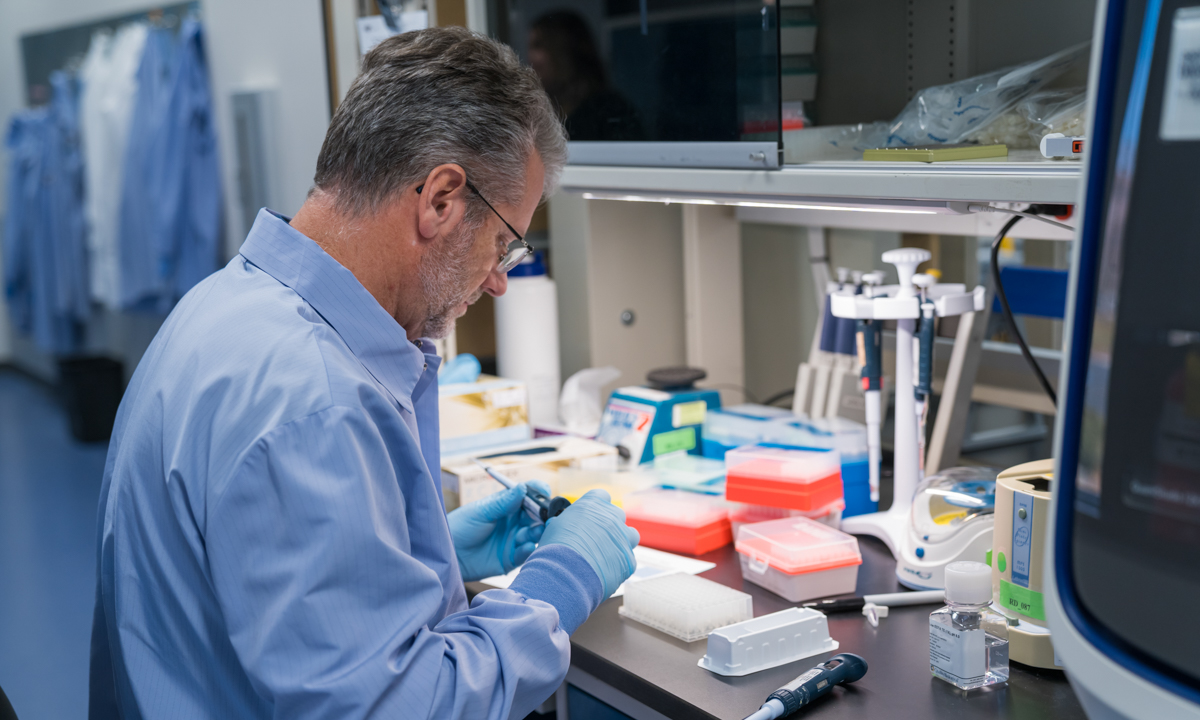
Michael Pyne, MS, a scientist in ARUP’s R&D Infectious Disease group, performs next generation sequencing (NGS) testing for HIV drug resistance, which is a lab-developed test.
Clinical laboratories will be forced to discontinue essential testing and patients will be harmed if the FDA enacts a proposed rule regulating laboratory-developed tests (LDTs) as medical devices, ARUP Laboratories’ chief medical officer (CMO) said in written comments submitted in advance of a March 21 hearing about the proposal before the House Committee on Energy and Commerce Subcommittee on Health.
In his comments, Jonathan Genzen, MD, PhD, ARUP’s CMO and senior director of governmental affairs, urged the FDA to halt advancement of the rule and instead work more closely with stakeholders toward “a balanced regulatory framework that will not negatively impact public health or create further undue burden on the clinical laboratory community, hospitals, healthcare systems, and patients.”
“I am very concerned that the FDA … is promoting a decreased confidence in the quality of clinical laboratory services … to enact LDT regulatory oversight. That portrayal is completely discordant with my own experiences in clinical laboratories and from interactions with truly incredible colleagues across the country,” Genzen wrote. “The community of more than 100,000 clinical laboratory professionals prides itself in a culture dedicated to patient care and continuous quality improvement, yet the FDA continues to convey a narrative to the public that many LDTs are unsafe.”
ARUP’s test menu contains more than 3,000 tests. Of those, many are LDTs, and some of those may have to be discontinued if the rule is enacted as currently written.
Staggering compliance costs would force many laboratories to stop offering some LDTs. In her opening remarks at Thursday’s hearing, Cathy McMorris Rodgers (R-WA), chair of the House Committee on Energy and Commerce, quoted an ARUP survey of the clinical laboratory community’s sentiment about the proposed rule, which showed that only 3% of respondents reported having the financial resources to support FDA user fees. Additionally, 61% of respondents said they would likely remove tests from their laboratory menus, and an additional one-third of respondents are not yet sure.
“For the overwhelming number of labs without the financial resources, they will have to stop performing tests, severely limiting access for some of our most vulnerable patient populations,” Rodgers said.
Genzen’s written comments conveyed a similar sentiment. “If laboratories cannot support user fees, they cannot continue offering essential diagnostic services. In this context, I am particularly concerned about the negative impact of the proposed rule for diagnostic testing in cancer, pediatrics, and rare disorders,” he wrote.
Five witnesses were invited to testify during the hearing, which took place on Thursday, March 21, 2024, at 8:00 a.m. (MDT), including Dara L. Aisner, MD, PhD, who is medical director of Colorado Molecular Correlates Laboratory, a representative of the Academic Coalition for Effective Laboratory-Developed Tests, and a patient with cancer.
“I’ve trusted my own care to LDTs even when FDA-approved choices are available for the same clinical question. Professionally, I find the FDA’s proposal to be misguided, and I worry for the future of American medicine. Personally, I fear the consequences for me and my family. LDTs are not devices. They are processes performed with expertise. Knowledge of all the steps, combined with an understanding of the scientific and clinical data, allows for nuanced care that simply cannot come from an assay kit,” Aisner said.
Other witnesses opposed to the proposed rule included Susan Van Meter, president of the American Clinical Laboratory Association (ACLA), and Donald S. Karcher, MD, FCAP, president of the College of American Pathologists (CAP).
Those more favorable to the proposed rule and invited to testify included Zach Rothstein, JD, executive director of AdvaMedDx, and Jeff Allen, PhD, president and CEO of Friends of Cancer Research, who acknowledged the need for modernizing regulatory requirements for diagnostic tests to protect both patients and innovation. Both those opposed to and in favor of the FDA’s proposal seemed to agree that the best path forward is legislative.
“In the absence of Congressional action, the FDA has moved forward with the public process of rulemaking. … No matter the path forward, action to ensure high-quality test performance is needed, and progress toward that end can no longer be stalled,” Allen said.
ARUP has repeatedly called for the FDA and the Department of Health and Human Services (DHHS), which oversees the FDA, to work with stakeholders to determine a better course of action, rather than imposing the rule.
In addition to the public comment submitted for Thursday’s hearing, ARUP is providing Senator Bill Cassidy, MD (R-LA), ranking member of the Senate Committee on Health, Education, Labor, and Pensions (HELP), a letter based on his request for information on ways to improve regulation of clinical laboratory tests in the United States.
Read ARUP’s public comment for the hearing here.
Learn more with ARUP’s informational resources, including ARUP’s survey of the lab community’s sentiments about the proposed rule, ARUP’s official public comment to the FDA, the ARUP study characterizing the use of LDTs, and a webinar on the impact of the proposed rule here.
Watch Aisner’s opening remarks below, and watch the entire hearing here.
*Note: The captions that appear within the above video were automatically generated, and ARUP cannot control their quality.
Bonnie Stray, bonnie.stray@aruplab.com
















